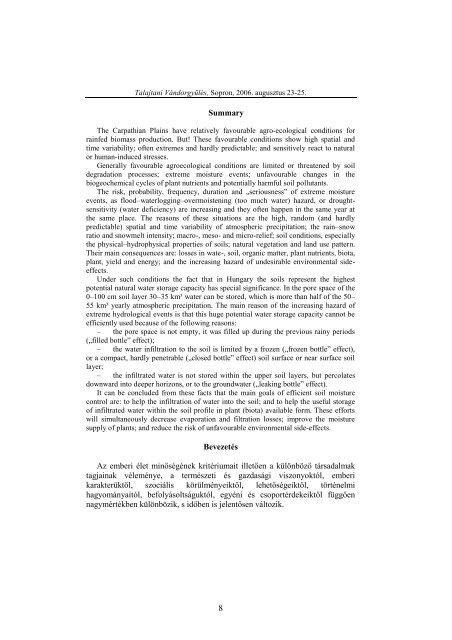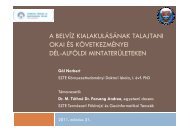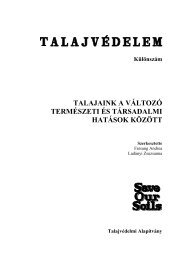- Page 1 and 2: Talajtani Vándorgyűlés, Sopron,
- Page 3 and 4: Talajtani Vándorgyűlés, Sopron,
- Page 5 and 6: Talajtani Vándorgyűlés, Sopron,
- Page 7: Talajtani Vándorgyűlés, Sopron,
- Page 11 and 12: Talajtani Vándorgyűlés, Sopron,
- Page 13 and 14: Talajtani Vándorgyűlés, Sopron,
- Page 15 and 16: Talajtani Vándorgyűlés, Sopron,
- Page 17 and 18: Talajtani Vándorgyűlés, Sopron,
- Page 19 and 20: FelszínilefolyásFelszínipárolg
- Page 21 and 22: Talajtani Vándorgyűlés, Sopron,
- Page 23 and 24: Talajtani Vándorgyűlés, Sopron,
- Page 25 and 26: Talajtani Vándorgyűlés, Sopron,
- Page 27 and 28: Talajtani Vándorgyűlés, Sopron,
- Page 29 and 30: Talajtani Vándorgyűlés, Sopron,
- Page 31 and 32: Talajtani Vándorgyűlés, Sopron,
- Page 33 and 34: Talajtani Vándorgyűlés, Sopron,
- Page 35 and 36: Talajtani Vándorgyűlés, Sopron,
- Page 37: Talajtani Vándorgyűlés, Sopron,
- Page 40 and 41: Talajtani Vándorgyűlés, Sopron,
- Page 42 and 43: Talajtani Vándorgyűlés, Sopron,
- Page 44 and 45: Talajtani Vándorgyűlés, Sopron,
- Page 46 and 47: Talajtani Vándorgyűlés, Sopron,
- Page 48 and 49: Talajtani Vándorgyűlés, Sopron,
- Page 50 and 51: Talajtani Vándorgyűlés, Sopron,
- Page 52 and 53: Talajtani Vándorgyűlés, Sopron,
- Page 54 and 55: Talajtani Vándorgyűlés, Sopron,
- Page 56 and 57: Talajtani Vándorgyűlés, Sopron,
- Page 58 and 59:
Talajtani Vándorgyűlés, Sopron,
- Page 60 and 61:
Talajtani Vándorgyűlés, Sopron,
- Page 62 and 63:
Talajtani Vándorgyűlés, Sopron,
- Page 64 and 65:
Talajtani Vándorgyűlés, Sopron,
- Page 66 and 67:
Talajtani Vándorgyűlés, Sopron,
- Page 68 and 69:
Talajtani Vándorgyűlés, Sopron,
- Page 70 and 71:
Talajtani Vándorgyűlés, Sopron,
- Page 72 and 73:
Talajtani Vándorgyűlés, Sopron,
- Page 74 and 75:
Talajtani Vándorgyűlés, Sopron,
- Page 76 and 77:
Talajtani Vándorgyűlés, Sopron,
- Page 78 and 79:
Talajtani Vándorgyűlés, Sopron,
- Page 80 and 81:
Talajtani Vándorgyűlés, Sopron,
- Page 82 and 83:
Talajtani Vándorgyűlés, Sopron,
- Page 84 and 85:
Talajtani Vándorgyűlés, Sopron,
- Page 86 and 87:
Talajtani Vándorgyűlés, Sopron,
- Page 88 and 89:
Talajtani Vándorgyűlés, Sopron,
- Page 90 and 91:
Talajtani Vándorgyűlés, Sopron,
- Page 92 and 93:
Talajtani Vándorgyűlés, Sopron,
- Page 94 and 95:
Talajtani Vándorgyűlés, Sopron,
- Page 96 and 97:
Talajtani Vándorgyűlés, Sopron,
- Page 98 and 99:
Talajtani Vándorgyűlés, Sopron,
- Page 100 and 101:
Talajtani Vándorgyűlés, Sopron,
- Page 102 and 103:
Talajtani Vándorgyűlés, Sopron,
- Page 104 and 105:
Talajtani Vándorgyűlés, Sopron,
- Page 106 and 107:
Talajtani Vándorgyűlés, Sopron,
- Page 108 and 109:
Talajtani Vándorgyűlés, Sopron,
- Page 110 and 111:
Talajtani Vándorgyűlés, Sopron,
- Page 112 and 113:
Talajtani Vándorgyűlés, Sopron,
- Page 114 and 115:
KlímakategóriaTalajtani Vándorgy
- Page 116 and 117:
Talajtani Vándorgyűlés, Sopron,
- Page 118 and 119:
Talajtani Vándorgyűlés, Sopron,
- Page 120 and 121:
Talajtani Vándorgyűlés, Sopron,
- Page 122 and 123:
Talajtani Vándorgyűlés, Sopron,
- Page 124 and 125:
Talajtani Vándorgyűlés, Sopron,
- Page 126 and 127:
Talajtani Vándorgyűlés, Sopron,
- Page 128 and 129:
Talajtani Vándorgyűlés, Sopron,
- Page 130 and 131:
Gen.szintMélységcmTalajtani Vánd
- Page 132 and 133:
Talajtani Vándorgyűlés, Sopron,
- Page 134 and 135:
Talajtani Vándorgyűlés, Sopron,
- Page 136 and 137:
Talajtani Vándorgyűlés, Sopron,
- Page 138 and 139:
Talajtani Vándorgyűlés, Sopron,
- Page 140 and 141:
Talajtani Vándorgyűlés, Sopron,
- Page 142 and 143:
Talajtani Vándorgyűlés, Sopron,
- Page 144 and 145:
Talajtani Vándorgyűlés, Sopron,
- Page 146 and 147:
Talajtani Vándorgyűlés, Sopron,
- Page 148 and 149:
Talajtani Vándorgyűlés, Sopron,
- Page 150 and 151:
Talajtani Vándorgyűlés, Sopron,
- Page 152 and 153:
Talajtani Vándorgyűlés, Sopron,
- Page 154 and 155:
Talajtani Vándorgyűlés, Sopron,
- Page 156 and 157:
Talajtani Vándorgyűlés, Sopron,
- Page 158 and 159:
Talajtani Vándorgyűlés, Sopron,
- Page 160 and 161:
Talajtani Vándorgyűlés, Sopron,
- Page 162 and 163:
Talajtani Vándorgyűlés, Sopron,
- Page 164 and 165:
Talajtani Vándorgyűlés, Sopron,
- Page 166 and 167:
Talajtani Vándorgyűlés, Sopron,
- Page 168 and 169:
Talajtani Vándorgyűlés, Sopron,
- Page 170 and 171:
Talajtani Vándorgyűlés, Sopron,
- Page 172 and 173:
Talajtani Vándorgyűlés, Sopron,
- Page 174 and 175:
Talajtani Vándorgyűlés, Sopron,
- Page 176 and 177:
Talajtani Vándorgyűlés, Sopron,
- Page 178 and 179:
TalajjellemzőkTalajtani Vándorgy
- Page 180 and 181:
Talajtani Vándorgyűlés, Sopron,
- Page 182 and 183:
Talajtani Vándorgyűlés, Sopron,
- Page 184 and 185:
Talajtani Vándorgyűlés, Sopron,
- Page 186 and 187:
Talajtani Vándorgyűlés, Sopron,
- Page 188 and 189:
Talajtani Vándorgyűlés, Sopron,
- Page 190 and 191:
Talajtani Vándorgyűlés, Sopron,
- Page 192 and 193:
Talajtani Vándorgyűlés, Sopron,
- Page 194 and 195:
Talajtani Vándorgyűlés, Sopron,
- Page 196 and 197:
Talajtani Vándorgyűlés, Sopron,
- Page 198 and 199:
Talajtani Vándorgyűlés, Sopron,
- Page 200 and 201:
Talajtani Vándorgyűlés, Sopron,
- Page 202 and 203:
Talajtani Vándorgyűlés, Sopron,
- Page 204 and 205:
Talajtani Vándorgyűlés, Sopron,
- Page 206 and 207:
Talajtani Vándorgyűlés, Sopron,
- Page 208 and 209:
Talajtani Vándorgyűlés, Sopron,
- Page 210 and 211:
Talajtani Vándorgyűlés, Sopron,
- Page 212 and 213:
Talajtani Vándorgyűlés, Sopron,
- Page 214 and 215:
Talajtani Vándorgyűlés, Sopron,
- Page 216 and 217:
Talajtani Vándorgyűlés, Sopron,
- Page 218 and 219:
Talajtani Vándorgyűlés, Sopron,
- Page 220 and 221:
Talajtani Vándorgyűlés, Sopron,
- Page 222 and 223:
Talajtani Vándorgyűlés, Sopron,
- Page 224 and 225:
Talajtani Vándorgyűlés, Sopron,
- Page 226 and 227:
Talajtani Vándorgyűlés, Sopron,
- Page 228 and 229:
Talajtani Vándorgyűlés, Sopron,
- Page 230 and 231:
Talajtani Vándorgyűlés, Sopron,
- Page 232 and 233:
Talajtani Vándorgyűlés, Sopron,
- Page 234 and 235:
Talajtani Vándorgyűlés, Sopron,
- Page 236 and 237:
Talajtani Vándorgyűlés, Sopron,
- Page 238 and 239:
Talajtani Vándorgyűlés, Sopron,
- Page 240 and 241:
Talajtani Vándorgyűlés, Sopron,
- Page 242 and 243:
Talajtani Vándorgyűlés, Sopron,
- Page 244 and 245:
Talajtani Vándorgyűlés, Sopron,
- Page 246 and 247:
Talajtani Vándorgyűlés, Sopron,
- Page 248 and 249:
Talajtani Vándorgyűlés, Sopron,
- Page 250 and 251:
Talajtani Vándorgyűlés, Sopron,
- Page 252 and 253:
Talajtani Vándorgyűlés, Sopron,
- Page 254 and 255:
Talajtani Vándorgyűlés, Sopron,
- Page 256 and 257:
Talajtani Vándorgyűlés, Sopron,
- Page 258 and 259:
Talajtani Vándorgyűlés, Sopron,
- Page 260 and 261:
Talajtani Vándorgyűlés, Sopron,
- Page 262 and 263:
Talajtani Vándorgyűlés, Sopron,
- Page 264 and 265:
Talajtani Vándorgyűlés, Sopron,
- Page 266 and 267:
Talajtani Vándorgyűlés, Sopron,
- Page 268 and 269:
Talajtani Vándorgyűlés, Sopron,
- Page 270 and 271:
Talajtani Vándorgyűlés, Sopron,
- Page 272 and 273:
Talajtani Vándorgyűlés, Sopron,
- Page 274 and 275:
Talajtani Vándorgyűlés, Sopron,
- Page 276 and 277:
Talajtani Vándorgyűlés, Sopron,
- Page 278 and 279:
Talajtani Vándorgyűlés, Sopron,
- Page 280 and 281:
Talajtani Vándorgyűlés, Sopron,
- Page 282 and 283:
Talajtani Vándorgyűlés, Sopron,
- Page 284 and 285:
Talajtani Vándorgyűlés, Sopron,






